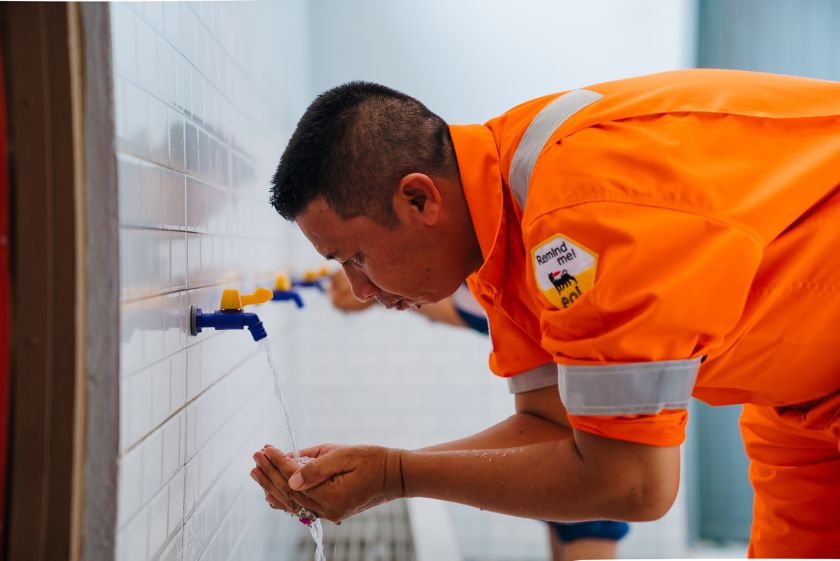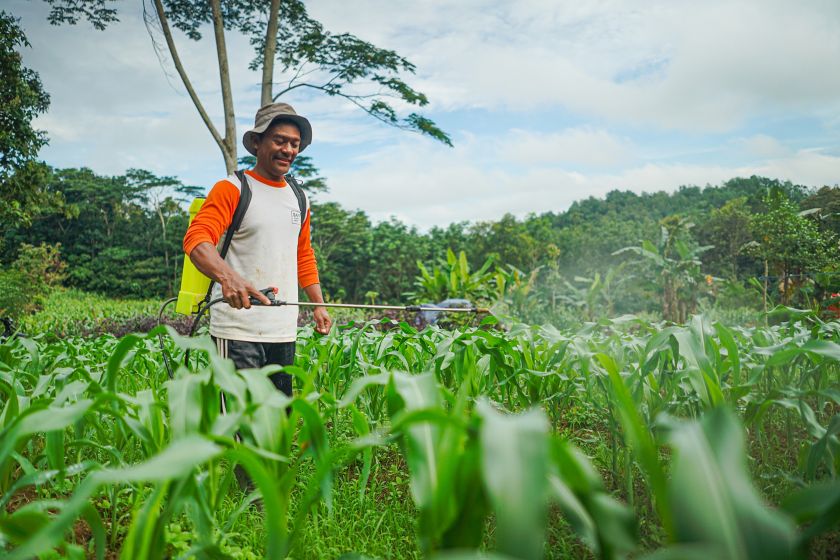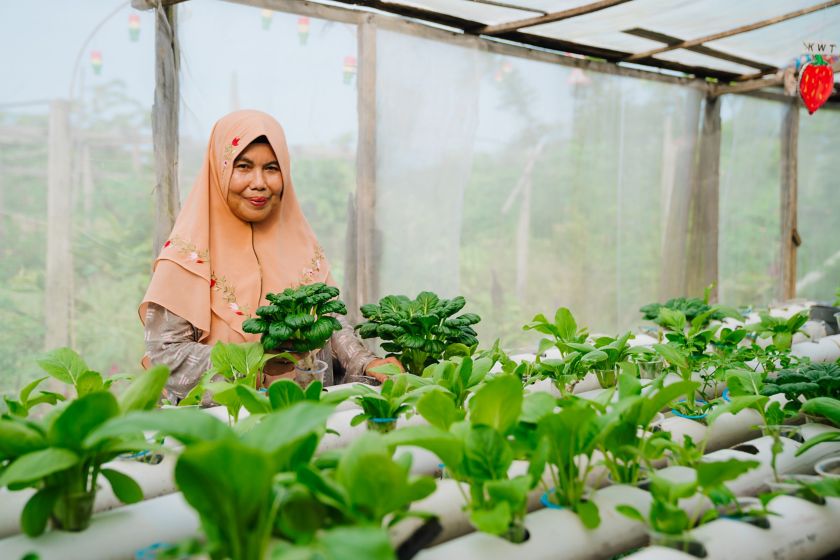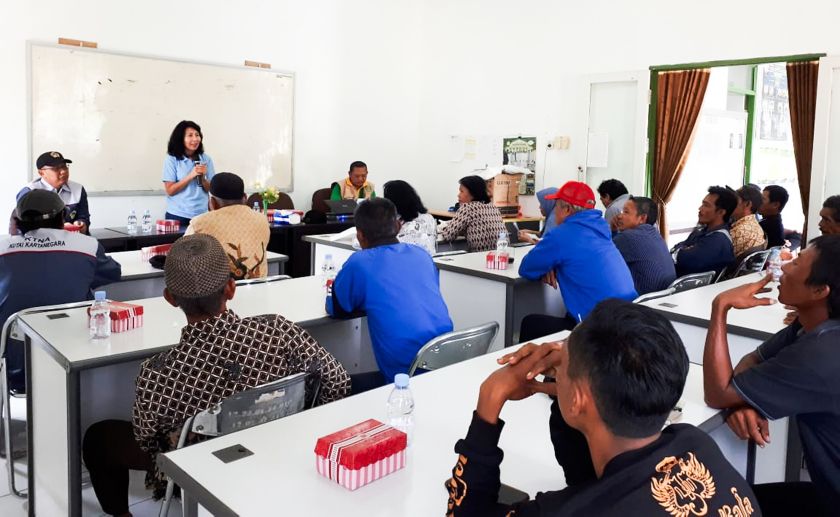Activity Type
Territory protection
Economic diversification
Access to water and sanitation
Community health

Or , our new artificial intelligence tool.

Our local development projects in Indonesia involve different areas. From ensuring access to potable water for residents of Muara Jawa and Samboja districts in East Kalimantan Province, to waste management education and training for local farmers in the Joglo Tani Kolong Langit (JTKL) centre. Our aim is to improve the quality of life of communities while protecting the environment.
The offshore fields of Jangkrik and Merakes in the country are important for natural gas supplies due to their strategic location. With our activities in this area, we help to ensure a fair and equitable transition that combines new energy sources with environmental protection and local development initiatives to support the population, with the aim of creating long-term value.
Indonesia
2018 – present
The programme we are developing in the districts of Muara Jawa and Samboja, East Kalimantan Province, by drilling wells and supplying reservoirs, provides drinking water through a water pipeline. We also conduct training programmes to highlight the importance of access to clean water and good practices to raise awareness among project beneficiaries.
In the Muara Jawa and Samboja area, a project to improve environmental quality involves planting fruit trees in the Samboja area, launching awareness campaigns on the importance of preserving biodiversity, and highlighting the crucial role of trees in reducing emissions and improving community health. Other campaigns focus on proper waste management. In the Muara Jawa area, we worked with a local contractor and authorities to rehabilitate a landfill site to convert plastic and organic waste into biofuel.

Access to drinking water, a priority for local communities

Joglo Tani, a benchmark for agricultural training

New techniques for cultivating and managing vegetable gardens

Programmes to promote proper waste disposal
The Joglo Tani Kolong Langit (JTKL) training centre is a reference point for those who want to improve their skills in integrated production. Agriculture is one of the main occupations in Samboja. Thanks to JTKL, local farmers have the opportunity to learn and share new techniques regarding vegetable cultivation and garden management, so that they can better meet their daily family needs independently.
Clean, Green and Healthy Samboja is a pilot project initiated by the local government with our cooperation, with the aim of ensuring a complete life cycle in waste management. Its special feature is that it has created a virtuous competition between local communities, who are called upon to keep their home environment clean and encourage neighbouring communities to do the same. Raising awareness of the importance of this issue is crucial in order to protect the environment and the hygienic conditions of residents.
benefit from the access to drinking water project
planted in the Samboja area
involved in the waste management programme
participate in 'Clean, Green and Healthy Samboja'
Read the stories, case studies and testimonials behind our contribution to a socially equitable energy transition in the Sustainability Report.


If you want to change topic, clear the chat and make a new query to receive more relevant results.
This will delete the question history.
If you want to change topic, clear the chat and make a new query to receive more relevant results. This will delete the question history.
Here you can find the full list of your queries.
The answers are generated by artificial intelligence, therefore they may contain inaccuracies. Please read the terms and conditions of use.

EnergIA is an innovative tool based on artificial intelligence capabilities, which can help you navigate the contents of eni.com, quickly finding answers to your questions. EnergIA can also perform a search on a specific topic, providing the most up-to-date data available, or it can invite you to delve deeper into a topic of your interest by suggesting links and specific readings. Start now!
EnergIA is an innovative tool based on artificial intelligence capabilities, which can help you navigate the contents of eni.com, quickly finding answers to your questions. Start now!
EnergIA (ener'dʒia) is a system based on Generative Artificial Intelligence.
Thanks to this technology, we can respond to your requests by querying the most relevant content and documents available on eni.com. (Note: financial documents from the last 12 months and press releases from the last 2 years are considered.)
Through EnergIA, you can delve into topics of interest and have a real-time window into the world of Eni.
If you wish to search for a specific document, press release or news, use the traditional search engine via the magnifying glass icon.
Like all systems that leverage Generative Artificial Intelligence, EnergIA may generate inaccurate or outdated responses. Always consult the sources that EnergIA proposes as the origin of the generated information.
If the system fails to find an exact match for the requested content, it still tends to provide a response.
If you find any inaccuracies in the provided response, please send us your feedback at the bottom of the page: it will be very helpful for us to improve.
Remember that the content generated by the system does not represent Eni’s official position. We therefore invite stakeholders to refer to their designated contacts for official statements: Press Office for journalists, Investor Relations for analysts and investors, Company Secretariat for shareholders etc..
EnergIA can understand questions posed in almost all languages, but we prefer to provide you with a response in English or Italian, the two languages available on eni.com. If you ask a question in Italian, the content on the site in Italian will be consulted. If you ask it in English or any other language, the content in English will be consulted. (Note: the language Eni uses for financial documents/content is predominantly English.)
If questions are formulated that violate the set security criteria, the system will not proceed with processing the response. Please remember not to send personal data.
By using this service, the users acknowledge that they have read and accepted the terms and conditions of use.
Search
EnergIA (ener'dʒia) is a system based on Generative Artificial Intelligence.
Thanks to this technology, we can respond to your requests by querying the most relevant content and documents available on eni.com. (Note: financial documents from the last 12 months and press releases from the last 2 years are considered.)
Through EnergIA, you can delve into topics of interest and have a real-time window into the world of Eni.
If you wish to search for a specific document, press release or news, use the traditional search engine via the magnifying glass icon.
Like all systems that leverage Generative Artificial Intelligence, EnergIA may generate inaccurate or outdated responses. Always consult the sources that EnergIA proposes as the origin of the generated information.
If the system fails to find an exact match for the requested content, it still tends to provide a response.
If you find any inaccuracies in the provided response, please send us your feedback at the bottom of the page: it will be very helpful for us to improve.
Remember that the content generated by the system does not represent Eni’s official position. We therefore invite stakeholders to refer to their designated contacts for official statements: Press Office for journalists, Investor Relations for analysts and investors, Company Secretariat for shareholders etc..
EnergIA can understand questions posed in almost all languages, but we prefer to provide you with a response in English or Italian, the two languages available on eni.com. If you ask a question in Italian, the content on the site in Italian will be consulted. If you ask it in English or any other language, the content in English will be consulted. (Note: the language Eni uses for financial documents/content is predominantly English.)
If questions are formulated that violate the set security criteria, the system will not proceed with processing the response. Please remember not to send personal data.
By using this service, the users acknowledge that they have read and accepted the terms and conditions of use.
A new window into Eni’s world, at your disposal. EnergIA is an innovative tool based on artificial intelligence capabilities, which can help you navigate the contents of eni.com, quickly finding answers to your questions.